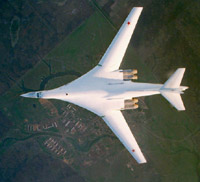Calling on Russian pilots to resume "combat duty," Russian President Vladimir Putin announced Aug. 17 that his country's strategic nuclear bombers would resume their Cold War-era practice of conducting long-range patrols "on a permanent basis." He told reporters that "our pilots have spent too long on the ground. I know that they are happy to now have this chance to begin a new life and we wish them luck." Although the main function of these aircraft is to conduct nuclear missile strikes against the continental United States, Putin said he hoped that other countries would show "understanding" for the Russian decision. Perhaps to Moscow's surprise, representatives of the Bush administration did precisely that. In Crawford, Texas, where the president was vacationing, White House spokesperson Gordon D. Johndroe told reporters that, "Militaries around the world engage in a variety of different activities." In Washington, State Department spokesperson Sean McCormack said that Moscow's action was not threatening since the two countries "certainly are not in the kind of posture we were with what used to be the Soviet Union." Alluding to the age and technological backwardness of the planes, McCormack added that, "If Russia feels as though they want to take some of these old aircraft out of mothballs and get them flying again, that's their decision." Some analysts might not be so sanguine. Russia's aging equipment and Russian air crews with less comprehensive training than their American or Soviet-era counterparts make the bombers more vulnerable to mechanical problems. During the Cold War, Soviet and U.S. bombers transporting nuclear weapons sometimes crashed, leading to costly environmental restoration programs and other hazards. At present, it is unclear whether they are carrying nuclear warheads on their patrols, though Putin's use of the term "combat duty" suggests such a possibility.
Russian Bombers Rehearse Nuclear Attacks Against the United States

